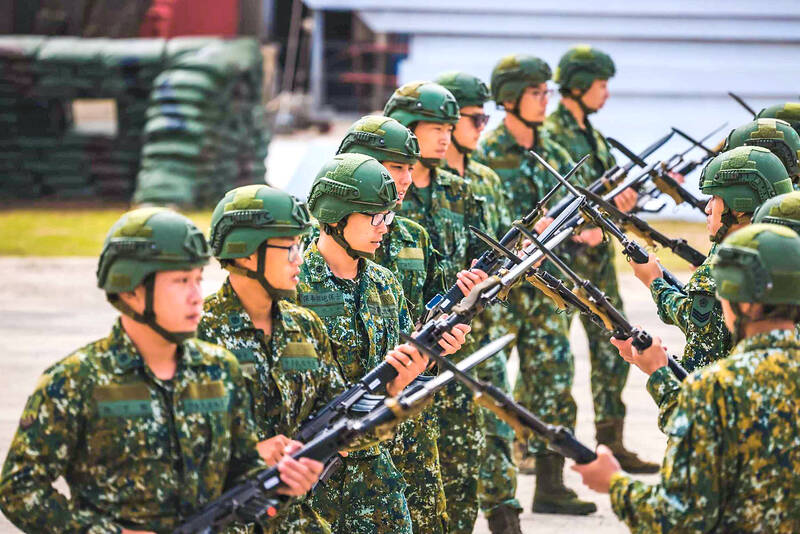The army is in the process of updating its decades-old traditional bayonet training with a program focusing on hand-to-hand combat to equip soldiers with more practical skills critical for survival on the battlefield, a senior military official said yesterday.
Ministry of National Defense (MND) Major General Liu Sheen-mo (劉慎謨), who is in charge of training, said military instructors at the Army Infantry Training Command’s Sports Science Center are studying the US military’s hand-to-hand closed-quarters combat program and will use it as a base when updating Taiwan’s decades-old bayonet program.
The ultimate goal is to come up with a new training program that would enable a soldier to use handheld weapons or a knife to take down a rival, which should significantly increase the soldier’s chances of survival, Liu told reporters during a media briefing.

Photo courtesy of the Penghu Defense Command via CNA
Liu made the comments in response to questions about the army’s replacement for the military’s traditional bayonet training that had been in place since 1965.
The new defense head last week pledged that it would be updated.
Speaking during a legislative session on Thursday last week, Minister of National Defense Wellington Koo (顧立雄) said that traditional bayonet training is ceremonial and more of a formality with very little practical use in close combat.
The decision to scrap the outdated program was made to allow troops to focus more on practical training sessions and enhance their defense capabilities, Koo said.
The traditional program was established in 1965 by combining US and Japanese styles of bayonet charge practices, but over the years, experts have criticized its practical use in close combat on the battlefield.
Koo, the nation’s first civilian defense head in a decade, has also announced that other decades-old traditions in the armed forces would be scrapped. This includes goose-stepping and overseas travel restrictions for military personnel.

The Coast Guard Administration (CGA) yesterday said it had deployed patrol vessels to expel a China Coast Guard ship and a Chinese fishing boat near Pratas Island (Dongsha Island, 東沙群島) in the South China Sea. The China Coast Guard vessel was 28 nautical miles (52km) northeast of Pratas at 6:15am on Thursday, approaching the island’s restricted waters, which extend 24 nautical miles from its shoreline, the CGA’s Dongsha-Nansha Branch said in a statement. The Tainan, a 2,000-tonne cutter, was deployed by the CGA to shadow the Chinese ship, which left the area at 2:39pm on Friday, the statement said. At 6:31pm on Friday,

The Chinese People’s Liberation Army Navy’s (PLAN) third aircraft carrier, the Fujian, would pose a steep challenge to Taiwan’s ability to defend itself against a full-scale invasion, a defense expert said yesterday. Institute of National Defense and Security Research analyst Chieh Chung (揭仲) made the comment hours after the PLAN confirmed the carrier recently passed through the Taiwan Strait to conduct “scientific research tests and training missions” in the South China Sea. China has two carriers in operation — the Liaoning and the Shandong — with the Fujian undergoing sea trials. Although the PLAN needs time to train the Fujian’s air wing and

The American Institute in Taiwan (AIT) put Taiwan in danger, Ma Ying-jeou Foundation director Hsiao Hsu-tsen (蕭旭岑) said yesterday, hours after the de facto US embassy said that Beijing had misinterpreted World War II-era documents to isolate Taiwan. The AIT’s comments harmed the Republic of China’s (ROC) national interests and contradicted a part of the “six assurances” stipulating that the US would not change its official position on Taiwan’s sovereignty, Hsiao said. The “six assurances,” which were given by then-US president Ronald Reagan to Taiwan in 1982, say that Washington would not set a date for ending arm sales to Taiwan, consult

A Taiwanese academic yesterday said that Chinese Ambassador to Denmark Wang Xuefeng (王雪峰) disrespected Denmark and Japan when he earlier this year allegedly asked Japan’s embassy to make Taiwan’s representatives leave an event in Copenhagen. The Danish-language Berlingske on Sunday reported the incident in an article with the headline “The emperor’s birthday ended in drama in Copenhagen: More conflict may be on the way between Denmark and China.” It said that on Feb. 26, the Japanese embassy in Denmark held an event for Japanese Emperor Naruhito’s birthday, with about 200 guests in attendance, including representatives from Taiwan. After addressing the Japanese hosts, Wang